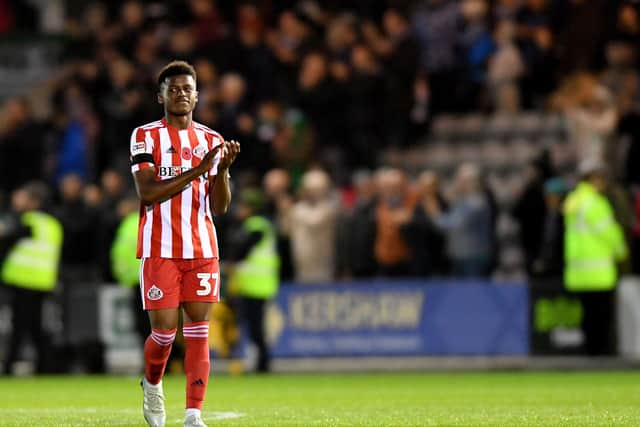Sunderland's Academy in Focus: Inside the controversial sale of Bali Mumba and the questions raised ahead of Norwich City move
and live on Freeview channel 276
Bali Mumba’s switch to Norwich City is set to be confirmed in the coming days and weeks.
The furore that met the news of his imminent departure reflected the bubbling frustration with two years of departures.
Advertisement
Hide AdAdvertisement
Hide AdLong considered one of, if not the most, talented player to come through the academy in recent times, his departure for a modest fee reflected what many reflected to be two years of failure of the Madrox regime.
Sunderland have not seen the most of his talent, nor they have been able to maximise on it in the revenue they are to generate.
It’s a transfer that magnifies many of the questions surrounding both the academy and the club more generally.
Specifically, the concerns over the pathway to the first team and the inability to convince young players there is a prosperous future for them on Wearside.
How the deal happened


Advertisement
Hide AdAdvertisement
Hide AdDespite a frustrating year in which Mumba’s progression seemed to stall (any analysis of his career so far must remember that he is still just 18, with time entirely on his side), the youngster remained one of the club’s bigger assets in the aftermath of a failure to escape League One at the second time of asking.
As talks were held with Norwich City during the nationwide lockdown, sources indicated a fear that the club could cash in on his value as Sunderland battled the significant implication of the COVID-19 crisis.
The deal itself raises some key questions.
Both Phil Parkinson and Jim Rodwell have distanced themselves from the sale, with Rodwell stating that he hadn’t really been involved in the talks.


The Echo understands these talks were led by Richard Hill, who recently departed the club.
Advertisement
Hide AdAdvertisement
Hide AdThis has been standard practice for much of the Madrox tenure. A former Eastleigh manager under Donald on two occasions, Sunderland’s former head of football operations had regularly led talks on financial matters, whether it be regarding player sales, acquisitions, or contract renewals.
Talks between the two clubs on this particular sale have been going on for some time, but a chief executive not being involved in the deal regarding a key club asset is unusual. Admittedly, it also seems highly likely to be a thing of the past given the dramatic recent changes behind the scenes at the club.
Parkinson also stated that the decision had not been his.
Both have indicated that the key factor in Mumba’s departure was the youngster having just one year left on his contract, and that there was not a willingness to extend it.
The fee Sunderland are set to receive was reported by Sky Sports to be around the £350,000 mark.
Advertisement
Hide AdAdvertisement
Hide AdThe Echo understands the eventual price is almost certain to exceed this, with the clubs negotiating a number of additional clauses.
The eventual deal will exceed what Sunderland would have been owed in compensation had Mumba left on a free next year, with a sell-on clause particularly key in such matters, protecting the Black Cats against Mumba realising his potential in future years.
It is not, however, a fee well in excess of what would be expected from compensation and while Mumba’s contractual status is relevant to an extent, it also serves as something of a misnomer.
Sentimental ties to Sunderland aside, Mumba is at a point where it is hard to make a case for him committing his long-term future.
How the pathway became muddled
Advertisement
Hide AdAdvertisement
Hide AdAs it stands, Mumba’s pathway to the first-team seems non-existent.
The youngster has not featured once during Parkinson’s tenure and while the Black Cats boss intends to take a close look at Jack Diamond in the pre-season period, Mumba does not seem to suit his preferred style and there has been little prospect of senior action.
The summer of 2018 seems long ago.
Then, the 16-year-old had made such an impression with his maturity in senior training that John O’Shea made the case that he should replace him in that final Championship clash against Wolves, symbolically taking the armband as a sign of things to come.
Jack Ross inherited a threadbare squad but when Mumba started the opening two games of the season, he was there on merit.
Advertisement
Hide AdAdvertisement
Hide AdHe had played throughout pre-season with a composure and maturity well beyond his years.
Even if opportunities throughout the season declined, he remained a regular in training and made a handful of further appearances.
Shortly after he signed his professional contract, Mumba was brought on by Ross to help see out a vital win away at Plymouth Argyle.
It was not a token gesture, given his quality, but it also served as a nod to his continued progression in training and his positive attitude.
Advertisement
Hide AdAdvertisement
Hide AdA reminder that he was still part of the action and still very much in his manager’s thoughts even when caution was clearly key.
He was unlucky not to see more action in the Checkatrade Trophy, which often clashed with his international youth commitments.
His last league appearance, though, came in December, a reflection of the challenge in showing faith in youth players as the pressure of a promotion race rises.
Last season would prove to be a difficult one, and the pressure around the first-team in general was only higher as the campaign began.
Advertisement
Hide AdAdvertisement
Hide AdRoss initially took the decision that it was important for Mumba to spend time with the U23s, as the jump to the first-team squad had been a well-earned but significant one.
That side, though, has not been an easy side to play in.
Sources feared that playing in such a poor side may have harmed the youngster’s progression, and it is clear that the change in management has not suited his prospects.
A gamble worth taking for upwardly-mobile Norwich?
So, without a doubt, Norwich City are taking something of a calculated gamble.
Time is on his side, but Mumba has much to prove, particularly when it comes to the physical demands of senior football and while his technical quality is not in question, staff at Sunderland have regularly stated that he has much to work on when it comes to his work off the ball.
Advertisement
Hide AdAdvertisement
Hide AdIt’s unarguable, too, that when building a squad for this season, Sunderland felt they were better served at first-team level by bringing in George Dobson from Walsall.
It is instructive, though, that Norwich are set to offer Mumba a place in their first-team squad as they push for an instant return to the Premier League.
Mumba has been told that he will offer cover in the right-back position.
The Canaries currently have Max Aarons and Sam Byram, but the future of the former is uncertain with the club likely to cash in on some of their prized assets this summer.
Mumba is unproven but Norwich believe he has potential.
Advertisement
Hide AdAdvertisement
Hide AdThe debate over his best position reflects the challenges that have been presented over the last year or so.
In the modern game, Mumba’s dribbling ability and composure on the ball make him an enticing prospect in the full-back position.
Yet in Sunderland’s U23 side, he has been playing in a team rarely able to make much of an attacking impression.
This is perhaps one of the reasons why Norwich have taken the gamble.
Advertisement
Hide AdAdvertisement
Hide AdThey have been tracking Mumba for some time and their reports suggested that he was a player who could thrive in a side better suited to his strengths, and the maturity with which he played last season means he still has much credit.
Norwich have proved exceptional at identifying young talent in recent years and integrating them into their set up.
If Stuart Webber, the club’s immensely respected sporting director who also thrived at Huddersfield Town, believes he may have secured a bargain, then perhaps that should be cause for concern.
A familiar story
Mumba’s hasty and disappointing departure reflects the concerns many have about Sunderland’s academy.
Advertisement
Hide AdAdvertisement
Hide AdHis pathway has become increasingly muddled and as a result, he leaves with Sunderland having seen neither the best of his talent or the revenue that could have generated.
As one club insider put to The Echo: “You look at the young lad Luke Matheson at Rochdale, he’s no better than Bali but they’ve sold him for £1million to Wolves and we are getting £350,000 for Bali, because he’s been stuck in the 23s and sent out to South Shields.
“If the strategy is that we want to sell players, be honest and work together. Look at what Manchester United do, they expose their academy players to the first team and if they don’t make it, at least their value has gone up.”
It’s a question worth pondering.
Even if there is a need or a will to sell players, Sunderland are not doing so in a way that means they are unable to get the best possible return.
Advertisement
Hide AdAdvertisement
Hide AdMumba’s development over the past two years further magnifies the fears that going into U18 and U23 campaigns with such weak squads could have long-term consequences, both in developing players and also in convincing those moving into the groups that they should stay to be a part of them.
There is no exact science to player development or football generally and no one can say for certain how Mumba will develop.
The sense, though, is that this has been an unsatisfactory end to the Sunderland career of one of their most talented prospects.
He has not been able to make a first-team impression, nor has he generated the kind of revenue that will sustain the club past a very short-term boost.
Advertisement
Hide AdAdvertisement
Hide AdThe overwhelming fear is that there will be too many from that era who this could prove to be the case with.
The third instalment in our series, published on Tuesday, will look closely at a vital summer for the Academy. What’s happened so far, and what needs to happen next...
